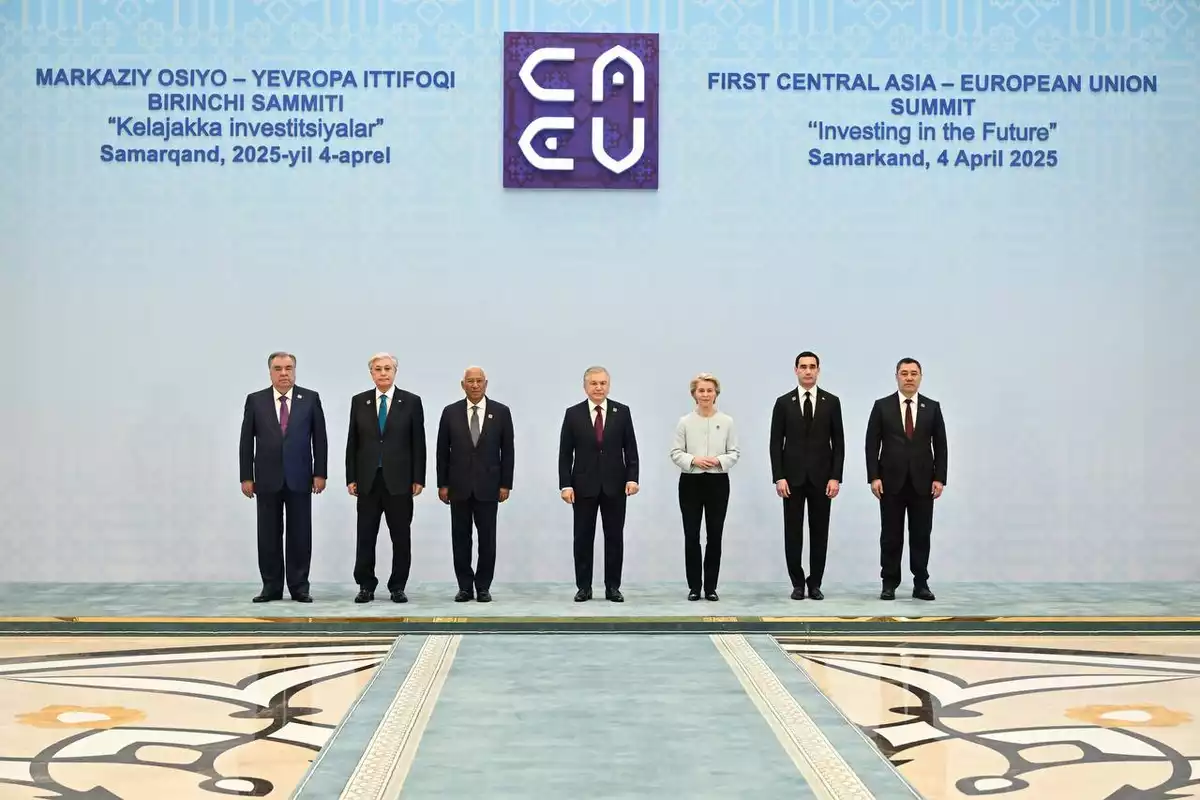
Photo: Uzbekistan President's press service
The inaugural Central Asia-European Union Summit, held in Samarkand on April 3-4, marked a key moment in enhancing relations between the two regions.
According to Sherzod Asadov, press secretary to Uzbekistan’s President Shavkat Mirziyoyev, the summit’s most significant outcome is the adoption of the Samarkand Declaration, which is expected to provide strong momentum for expanding constructive dialogue and cooperation across all sectors, The Caspian Post reports, citing The Times of Central Asia.
In a statement, the EU reaffirmed its “commitment to deeper cooperation in an evolving global and regional geopolitical landscape [and] upgrade relations between the European Union and Central Asia to a strategic partnership.” The EU declaration also committed the bloc to respect the “sovereignty and territorial integrity of all states within the framework of all international and regional fora” and expressed readiness to “address common security challenges.”
Economic cooperation featured prominently on the agenda. Since 2020, trade between Uzbekistan and the EU has doubled, now exceeding €6 billion. Uzbek exports to the EU have quadrupled, and the number of joint ventures has surpassed a thousand. European investment projects in Uzbekistan, meanwhile, are now valued at over €30 billion.
A key development was the agreement to open a regional office of the European Investment Bank (EIB) in Tashkent. Established in 1958, the EIB is the EU’s primary financial institution, and its new office is expected to attract greater investment in green energy, modern infrastructure, and digitalization.
The European Bank for Reconstruction and Development (EBRD) has also deepened its engagement in Uzbekistan, investing over €5 billion to date. “We must work together to simplify trade procedures and ensure that Central Asian products gain greater access to European markets. Only through joint efforts can we build a strong and resilient economic partnership,” Mirziyoyev told Euronews. “Over the past seven years, the trade turnover between Central Asian countries and the EU has quadrupled, amounting to 54 billion euros… The signing of the Samarkand Declaration will reflect the common aspiration of the parties to establish a strategic partnership and lay the foundation for deepening ties between our regions.”
During the summit, Mirziyoyev met with European Commission President Ursula von der Leyen and European Council President António Costa. Discussions focused on trade, investment, green energy, and digital development, with the EU’s “Global Gateway” strategy, a counterpart to China’s Belt and Road Initiative, a central topic. The initiative is seeking to enhance global infrastructure and connectivity while promoting sustainability and transparency.
“The EU and Central Asia are becoming closer partners, and this summit marks the beginning of a new phase in our cooperation,” von der Leyen stated. An Enhanced Partnership and Cooperation Agreement between Uzbekistan and the EU is also under negotiation.
The Summit also offered a platform for Central Asian heads of state to hold bilateral discussions. Mirziyoyev met with his counterparts from Kazakhstan, Kyrgyzstan, Tajikistan, and Turkmenistan. Talks centered on increasing trade, improving border security, and advancing major infrastructure projects. A recent landmark border agreement between Uzbekistan and Kyrgyzstan was lauded as a breakthrough.
Uzbekistan and Kazakhstan agreed to accelerate the development of the International Industrial Cooperation Center, which was ratified by the Kazakh Mazhilis in early February, while progress was also made on the planned “Shovot-Tashovuz” joint border trade zone between Uzbekistan and Turkmenistan.
As economic ties between Central Asia and Europe deepen, recent U.S. trade tariffs may further accelerate the shift. The Trump Administration’s new tariffs imposed a 10% duty on exports from Uzbekistan, Turkmenistan, Tajikistan, and Kyrgyzstan, whilst Kazakhstan faces a notably higher 27% duty.
These tariffs could disrupt regional trade flows, positioning the EU as an increasingly attractive economic partner.
Share on social media